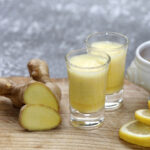From spice rack to superhero: How ginger puts infection-fighting white blood cells on “high alert”
 (NaturalHealth365) Experts warn that antibiotic resistance, in which disease-causing bacteria become immune to the drugs meant to defeat them, is reaching dangerous levels worldwide. In fact, even the Centers for Disease Control reports that this emerging public health crisis caused over 5 million deaths around the globe in 2019 alone. As scientists scramble to identify natural products that can serve as alternatives to antibiotics, a common kitchen spice – ginger – is giving rise to new hope.
(NaturalHealth365) Experts warn that antibiotic resistance, in which disease-causing bacteria become immune to the drugs meant to defeat them, is reaching dangerous levels worldwide. In fact, even the Centers for Disease Control reports that this emerging public health crisis caused over 5 million deaths around the globe in 2019 alone. As scientists scramble to identify natural products that can serve as alternatives to antibiotics, a common kitchen spice – ginger – is giving rise to new hope.
Ginger root, prized in the Ayurvedic and traditional Chinese medicine healing systems, has long been believed to support immune system health. Now, a new scientific study shows that a compound found in ginger can boost the readiness of white blood cells to fight infection. Let’s look at the intriguing mechanisms that allow ginger to put the body’s defense system on high alert.
Compound in ginger gives the “all hands on deck” signal to infection-fighting immune cells
The study, conducted at the Technical University of Munich and published in Molecular Nutrition and Food Research, examined the effect of gingerol – a pungent compound found in ginger – on immune cells known as neutrophil granulocytes. Often referred to as the “first line of defense” against infection, neutrophils destroy disease-causing bacteria and other pathogens by engulfing them, a process known as phagocytosis. (For good measure, neutrophils release anti-microbial enzymes as well).
The researchers found that gingerol seemed to enhance the inclination of neutrophils to attack pathogens. In other words, gingerol helped to “prime” the neutrophils, moving them from a resting state to a “ready to go” state. When researchers exposed cells to a peptide that mimics bacterial infection, they found that cells stimulated by the gingerol reacted about 30 percent more strongly than untreated cells.
Even modest amount of gingerol triggers beneficial response
The scientists found that the gingerol worked through a specific receptor, TRPV1, located on the neutrophils. (TRPV1 is also the receptor for capsaicin, the active component of chili peppers). And the team found that even very low concentrations of gingerol were enough to modulate cell activity. This supports the assumption that even modest amounts of gingerol – such as the amount found in a liter of ginger tea – could help “tweak” the immune system for the better. In addition, the ginger compounds appeared to enter the blood rapidly (roughly 30 to 60 minutes after consuming a liter of ginger tea).
While more research is needed to further unlock the infection-fighting capabilities of ginger and its compounds, the study provides a fascinating peek into the process. Additionally, it supports what forward-thinking doctors and herbal healers have always maintained: ginger enhances the ability of the immune system to target and destroy invading bacteria.
Ginger combats the microbial culprits responsible for common illnesses
In addition to promoting immune system defense against pathogens, gingerol has antibacterial, antifungal, and antiviral properties of its own. In a 2017 review published in the International Journal of Molecular Science, the authors cited laboratory studies showing that gingerol significantly inhibited the growth of multiple pathogens – including salmonella (a common food-borne microbe that causes diarrhea, fever, and stomach pains), E. coli, P. gingivalis (implicated in gum disease) and P. aeruginosa.
Most impressive of all, gingerol has been shown to work against methicillin-resistant staphylococcus aureus – the bacteria commonly known as MRSA. While ginger is not a silver bullet against pathogens, it appears to be able to discourage their growth – and to do so without contributing to the scourge of antibiotic resistance.
Elevate recipes with ginger while supporting immune health
You can access the benefits of ginger – and its lemony, spicy flavor – in a variety of ways. Employ it fresh or powdered in poultry, beef, and seafood recipes, or add the sliced or minced root to salads, salsa, and marinades. You can also partake in a zingy ginger shot, nibble on pickled ginger, or ginger in a fresh juice. (Ginger partners particularly well with apple, carrot and lemon juices).
To make a spicy, energizing ginger tea, wash and thinly slice a two-inch piece of fresh ginger root, then add to hot water and boil for ten to 30 minutes. Strain, allow the mixture to cool, and then sip away. If desired, you can sweeten it with raw honey and add a splash of lemon juice. (By the way, scientists report that ginger stimulates an enzyme in saliva that breaks down sulfur compounds, resulting in fresher breath. Is there no end to the benefits of this versatile spice?)
Many holistic doctors advise ginger to reduce pain and inflammation. Multiple studies have supported its use in treating osteoarthritis and menstrual cramps, and a 2020 review published in Cytokine credited it with lowering inflammatory markers such as C-reactive protein. Ginger is also advised to regulate blood sugar, promote healthy digestion, ease nausea, and protect against cognitive decline and Alzheimer’s disease.
Supplementary ginger is available in the form of capsules, tablets, tinctures, and extracts. Holistic healthcare providers typically advise amounts of 500 mg two or three times a day but check with your own doctor before supplementing.
No doubt, this new study suggests that natural herbs offer a safe way to eliminate the threat of antibiotic resistance, especially when used with other healthy lifestyle choices. So, go ahead and add this hard-working herb to your diet and enjoy the health benefits today.
Sources for this article include:
Onlinelibrary.wiley.com
Sciencedaily.com
Sciencedaily.com
Clevelandclinic.org
NIH.gov
WHO.int
CDC.gov
NIH.gov



